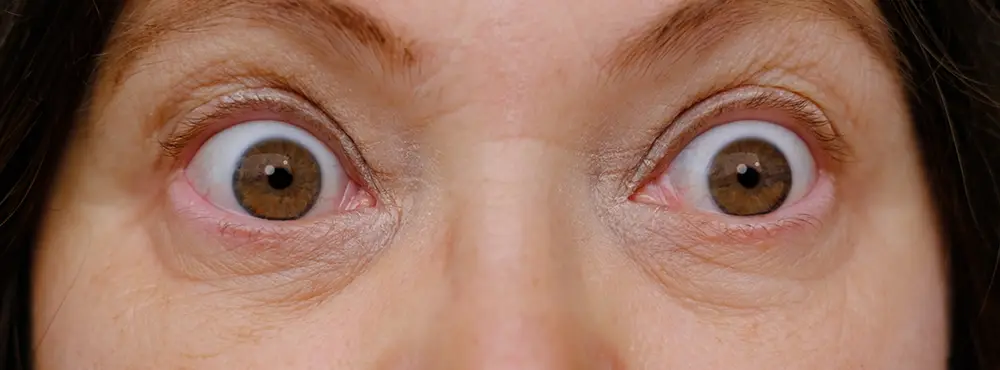Proptosis is the medical term for eyes that are pushed forward from inside the orbit. If associated with thyroid dysfunction this is known as exophthalmos.
What is Exophthalmos caused by?
Exophthalmos (proptosis due to thyroid dysfunction) is most commonly caused by Graves' ophthalmopathy.
Graves' ophthalmopathy is where the immune system attacks healthy tissue mistakenly. With thyroid eye disease, the immune system attacks the muscles and fatty tissue surrounding the eyes, causing them to become swollen and bulge.
This autoimmune condition is more common in women and smokers. It affects 1 in every 3 people with an overactive thyroid gland (hyperthyroidism) from Graves' disease. Occasionally thyroid eye disease can affect those with an underactive thyroid gland and sometimes even those with normal thyroid function.
What is bulging eyes a symptom of?
What are the other causes of proptosis?:
- Infection of the tissue in the eye socket
- Tumours
- Bleeding behind the eyes
Proptosis symptoms
Proptosis can lead to symptoms such as:
- Pain in the eyes
- Dry eyes
- Eye irritation
- Sensitivity to light
- Double vision
- Blurred vision
- Vision loss
- Pressure behind or around your eyes
- Trouble moving your eyes
- Eye secretions and teary eyes
Can proptosis be treated?
The treatment of proptosis depends on the cause, and severity. If there is risk of compression to the optic nerve prompt intervention is required and may require surgery.
Assessing proptosis
An ophthalmologist (eye specialist) will check a range of things.
They may do the following:
- Check your eye movements
- Arrange for an MRI scan or CT scan
- Measure how far your eyeball protrudes using an exophthalmometer
- Organise a blood test to check your thyroid gland
How do you treat exophthalmos/proptosis from Grave’s disease?
The treatment of Grave’s disease involves trying to reset the immune system, treating the thyroid hormone levels, and the eye problems that may develop.
There are two phases of thyroid eye disease that can occur at the same time as the thyroid dysfunction, after the onset of thyroid dysfunction, or may even precede detected thyroid dysfunction.
The two phases are:
- An active phase (which can last for up to two years) where they may be redness, pain and swelling.
- An inactive phase where the condition has settled down, but you may be left with long-term eye problems such as dry eye, double vision or a different eyelid position (ptosis or retraction).
Treating thyroid hormone levels
An overactive or underactive thyroid may be treated with medicine to correct the thyroid hormone levels in your blood.
Home treatment and self-care
Your doctor might also recommend the following during the active phase of thyroid eye disease:
- Not smoking reduces the risk of more severe disease
- Using extra pillows to raise your head while lying in bed
- Wearing sunglasses if you are also affected by photophobia
- Lubricating your eyes with eye drops
- Avoiding irritants such as dust and dirt
Steroids
In severe cases of exophthalmos you may need high dose corticosteroids, and sometimes other similar disease modifying drugs. These help to control inflammation and stabilise the condition.
Radiotherapy
If corticosteroids are ineffective, orbital radiotherapy can be used alone or in conjunction with corticosteroids.
This type of treatment carries risks such as short-term vision problems, cataracts, and retinopathy.
Surgery
If exophthalmos is severe or persistent, surgery may be required. It may need to be carried out during the active phase, if exophthalmos poses an immediate threat to your vision, or in the inactive period.
Is Grave's disease hereditary?
It is unclear if Graves’ disease is hereditary, as many genetic and environmental factors can increase the risk of one having the disease. Nevertheless, those who have close relatives with an autoimmune disorder, including Graves’ disease, are more likely to develop it.
Does thyroid eye disease get better?
Symptoms of thyroid eye disease may worsen during the active phase, which can last for up to 2 years; however, thyroid eye disease can get better during the inactive period when the eye settles down. The right treatment can also help thyroid eye disease get better and improve the appearance of bug eyes.
Quick links:
A guide to retinal detachment
A guide to dry eye
A guide to double vision
Disclaimer: The advice in this article is for informational purposes only and does not replace medical care or an in-person check-up. Please check with an eyecare professional before purchasing any products or remedies. For information on our article review process, please refer to our Editorial Policy.

 Offers
Offers Account
Account
 Favorite
Favorite
 Basket
Basket

 OFFERS
OFFERS
















